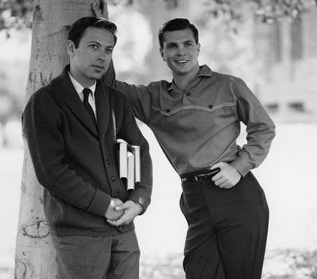I've been seeing ads for a Boss Baby tv series on Nickelodeon for a long time, maybe years, and I always think "A paeon to capitalist excess! Disgusting!" But then this photo icon appeared.
Tell me that doesn't look like two boy babies about to kiss.
Could there possibly be gay representation in a tv series about babies?
So I turned on the first "new episode," which turned out to be in Season 4.
Four years of this already!
Scene 1: The Boss Baby is sending out several teams to do some sort of spy work in the supermarket; they substitute baby magazines for general interest magazines,; they get a dirty diaper disposed of; an operative plays the "peek-a-boo" game with random passersby. Sometimes they are stymied by adult conventions: they can't use a telephone, since they don't know numbers, and when a passerby plays the "got your nose" game, the operative believes that his nose has actually been stolen.
What is this all for? How does this make money for Boss Baby's corporation?
Scene 2: The Big Boss invites Boss Baby to lunch in the executive dining room (where they are fed by a French waiter who says "Monsieur, here comes l'avion"). We get an explanation: the corporation is sellng "baby love," trying to get adults to love babies more than other people and things. Boss Baby wants to control the entire love market: "They can like whatever they want, but when it comes to that bone-deep love, they should only be thinking of one thing: babies."
Hopefully you don't mean making more babies.
The Big Boss says that Boss Baby is doing everything right, except running a well-organized office. He disapproves of the "renters": puppies with their own puppy-love business.
Scene 3: Back at the office, Boss Baby explains to his hanger-on older brother, Tim, that he can't just evict the puppies: they have an iron-clad contract and good puppy lawyers. He has to get creative.
But there's no time: he is scheduled to appear at Tim's Do-Good Trooper Safety Showcase.
Scene 4: Boss Baby delegates the puppy problem to his employees, and heads for the safety showcase.
It's older kids on a stage, talking ad infinitum about safety (what to do if you step in poison ivy, drink poison, catch fire, and so on), with the parents in the audience, Boss Baby acting like a real non-sentient baby on his father's lap. Everyone gets bored and falls asleep.
Scene 5: The family drives home, but Tim "wanted to walk home with Petrovsky." A buddy-bond homoromance?
Cut to the two walking home, complementing each other's performance.
Suddenly a tree crashes onto a parked car, and they rush to the rescue of Frankie, the baby inside. Why was she in the car alone? She was on a mission, trying to install a baby love air freshener.
The adults arrive and praise the boys as heroes, whch angers Frankie: "you swoop in and steal all the love for yourselves!" Now boy-love is competing with baby-love (maybe "boy love" isn't the best term for it.)
Scene 6: Back at work. (How do the babies get away from supervising adults long enough to go to work?). The employees explain that they tried to get rid of the puppies by raising the rent so they couldn't afford to stay there, but the puppies just sublet out their space to a third company, "preeks" (pre-kindergarten kids).
Boss Baby is inundated by work, but Tim calls and invites him to the ceremony where he and Petrovsky will be lauded for saving the baby (right now? not in a few days?).
He quickly comes up with a solution to the puppy-and-preak problem: open office floor plan, no privacy, so they will drive each other crazy and leave).
Scene 7: At the ceremony, the boys start their interminable safety scenario bit, while the adults all groan.
Boss Baby runs into Frankie, who reveals her revenge plan: she has applied lard to the floor, so when the adults try to stand, they will slip and fall, and blame the boys; thus the love will revert back to babies.
Boss Baby wants to save his brother from humiliation, so he calls the head puppy and offers to let his company stay, if they all come to the museum in 15 seconds (seems impossible, but then, this office might not be in our world).
The adults try to stand, slip and fall, and start to blame the boys. Then the puppies arrive, and the adults blame them, assuming that they were eating chicken and left grease on the floor. Love for puppies goes down, love for boys remains the same. No win for babies, but family has to come before business. The end.
Beefcake: No. Some of the adults are cute, in a computer-animated way.
Heterosexism: No one expresses any heterosexual interest.
Gay Characters: Buddy-bonding subtext between Tim and Petrovsky but only for a few seconds, not even enough for a subplot. We never see the black-haired baby that Boss Bay is almost kissing in the icon.
The grown-up Tim, who narrates the original movie (there was a movie?), has a wife and daughter, so we may assume heterosexual identity. The grown-up Boss Baby, now named Ted, does not, so maybe we can assume gay identity. Some reddits ask "Is Boss Baby GAY?"
My Verdict: The babies-as-businesspeople jokes are clever, but there is not enough satire of the corporate world -- everyone seems perfectly nice. And the premise is inconsistent. Maybe in other episodes we find out exactly how the adult world-baby world interacts.
Update: The black-haired baby is a rival. It's hard to distingiush between romantic interest and threat.
See also: Boss Baby: Back in the Crib.

















